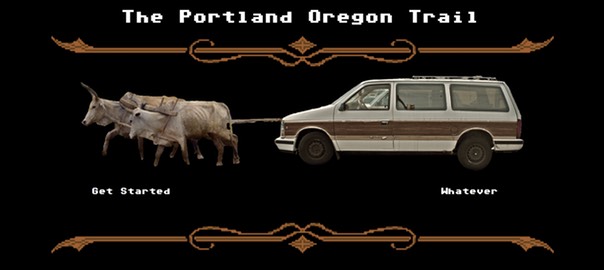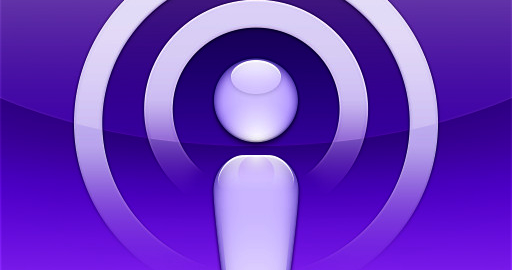TLDR: We made a silly game you can play it here: http://pot.robertdall.com But really… your gonna want to keep reading.
I heard about these Comedy Hack Days and I, though. You spend and entire weekend building something just to get a laugh? Isn’t there an easier way?
But then my buddy and Later co-founder Ian MacKinnon brought the funny hackathon weekend to Vancouver. So I read about it and thought well that sounds hilarious, and you had to apply to go, you had to tell the organizers why you wanted to go, What you could offer, what skills you have. That preference along with Ian running the show how could I not apply?
In the morning we pitched our idea. Those who applied in groups said what they would be working. I tried and failed to pitch my dating app based on your podcasting preferences or Public Radio Dating as a service which people actually though it was too realistic.
But Wes Lord pitched an idea called “Portland Oregon Trail” Which recreates one of the games of my childhood The Oregon Trail.
“Where we wrangle up an intrepid band of hipster adventurers at a poetry slam in Omaha Nebraska and set sail for the cooler pastures and fair trade organic coffee of Portland Oregon, In 2008, Before it was mainstream.” ~ Wes Lord
I went into the foyer and met up with Wes Lord, Aaron Shaw, Max Ahn, Kelvin Lau who later became the team Portland Oregon Trail. We decided to build the game in the browser as appose to an App as we were all pretty much familiar with the web, but only some had app building experiences.

It was amazing how fast we just got down to work and started submitting code to our GitHub repo. I had a previously poor hackathon experience at a different event, but this was the complete opposite. We couldn’t believe what we accomplished on the first day and how well everyone worked together.
Also props to Lighthouse Labs / Launch Academy for providing an awesome working space and the organizing committee with plenty of food, drinks and coffee and awesome bandwidth to keep us going. Also to some anonymous sponsor who purchased Carmel Corn for everyone because he felt it was important to have a snack.

I was the design and graphics person, as the rest of the guys had the all of the javascript knowledge needed to run the game. Wes Lord and I were also the only two that played the original game. Luckily Internet Archive had a copy all the others could play.
We got a decent night sleep as hackathons go as we’d completed a lot that first day and we hit the code again the next morning. Sunday was harder than Saturday as we were doing a lot of QA and fine tuning for the semi-finals that were behind held downstairs that afternoon at The Hive.
I got some serious max brotherly love right. He is kicking some code ass! #chdyvr pic.twitter.com/cEAyrK4gSv
— Robert (@robertdall) November 6, 2016
Sometimes the irony of the situation that we presented ourselves was funny enough. Yes the colour graphics from emulator of the Oregon trail was not web safe. (I know nothing needs to be web safe anymore but when I got the RGB covered it hex I found it some what ironic.)
We also had to find a Commodore 64 True Type font which we then converted into a web font and displayed it as a 8-bit font via @font-face which has only been available for mass usage since 2011.
~~~
We presented, and were lucky enough to be voted by our peers to show our game at the finals! The Competition would be tough, the finalist were:
• PMPL – a social networking app that brings people with pimples to people who want to pop them.
• Rock out with my Rock out – A pet rock “Dwayne Johnson” App for your phone!
• PokeMAN Go – Pokemon Go using real people using a facial recognition api to catch real people. (Yes it actually worked similar to Pokemon Go)
• Burning Bridges – Russian Roulette generator that if you lose it send an insult to someone in your address book.
• Portland Oregon Trail – Hipster’s trying to make it to the promise land.
We presented to rousing applause and laughter having a comedian like Wes presenting made for a presentation.
https://www.youtube.com/watch?v=EtWpCSXRdRc
My favourite @CHDyvr is probably The Portland Oregon Trail. Hipster road trip game FTW. 😉 #chdyvr pic.twitter.com/dbeMCxPKIX
— Vivian Lago (nee Chan) 🦄 (@vchan) November 7, 2016
We ended up getting third losing out the funny yet equally disgusting PMPL getting second and the PokeMAN Go winning the event.
Conclusion
Although a little physically tired I actually felt rejuvenated in other way. We actually accomplished something in less then 48 hours I actually want to show to people. Yes, there are bugs, yes the code isn’t prefect, but yet what we were able to accomplish in two days was pretty awesome for people who didn’t know 15 minutes before decided to built the thing. If your a designer, comedian, coder and your looking a for fun you should really apply next year. I am sure it will be a lot of fun.
Oh and you play the game yourself. There is a number of easter eggs and inside jokes amongst the code. Drop me a note in the comments if you find one of them.












